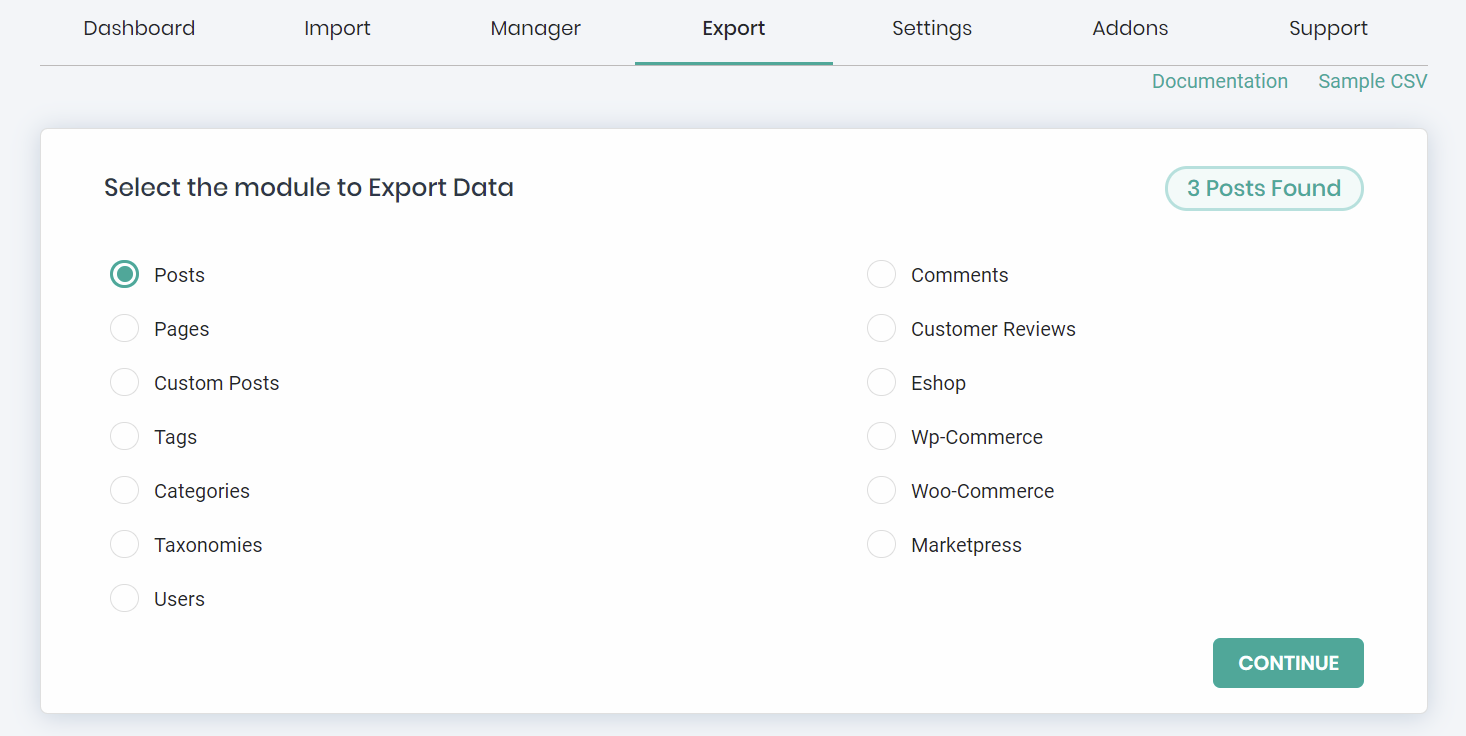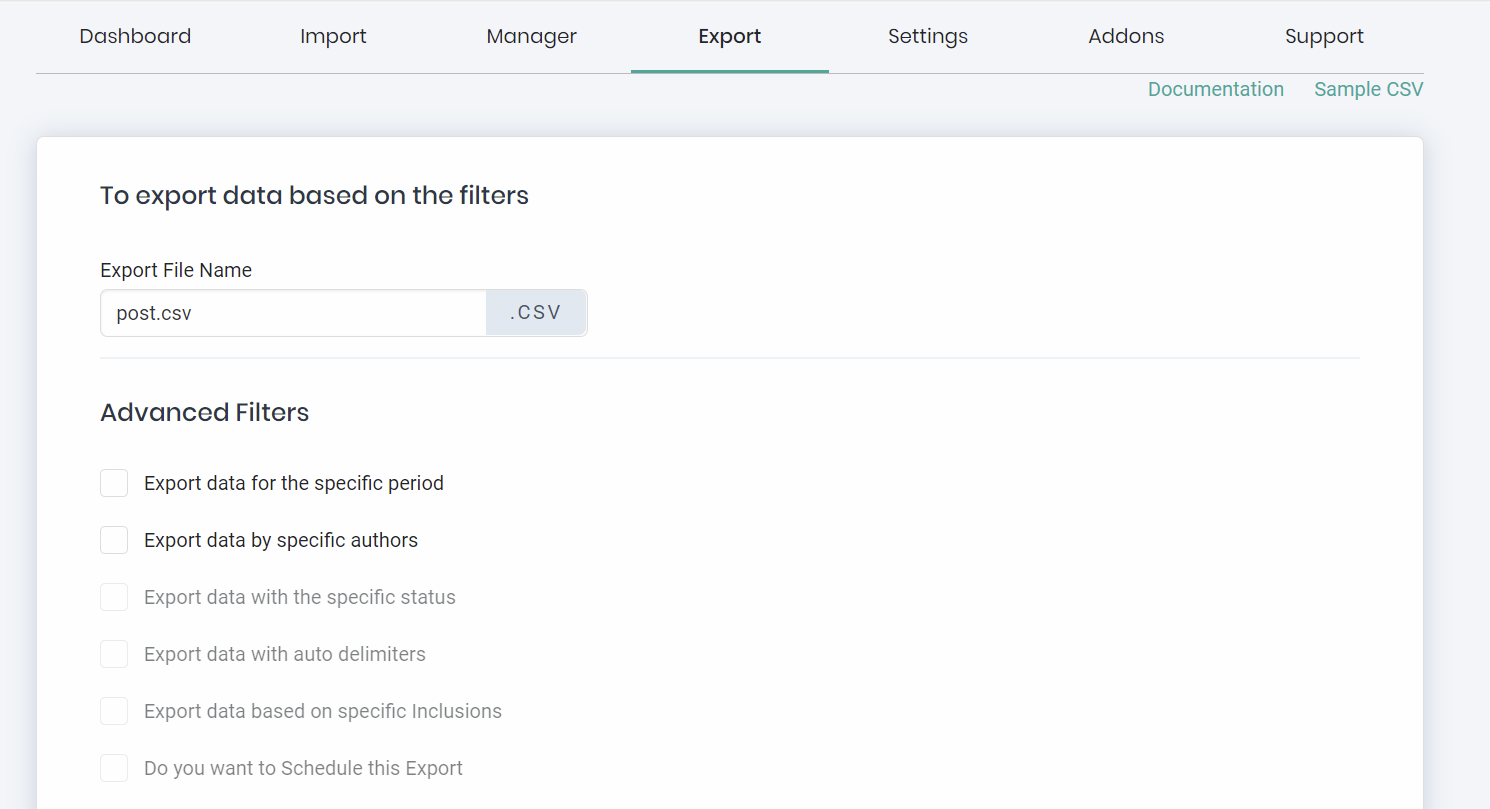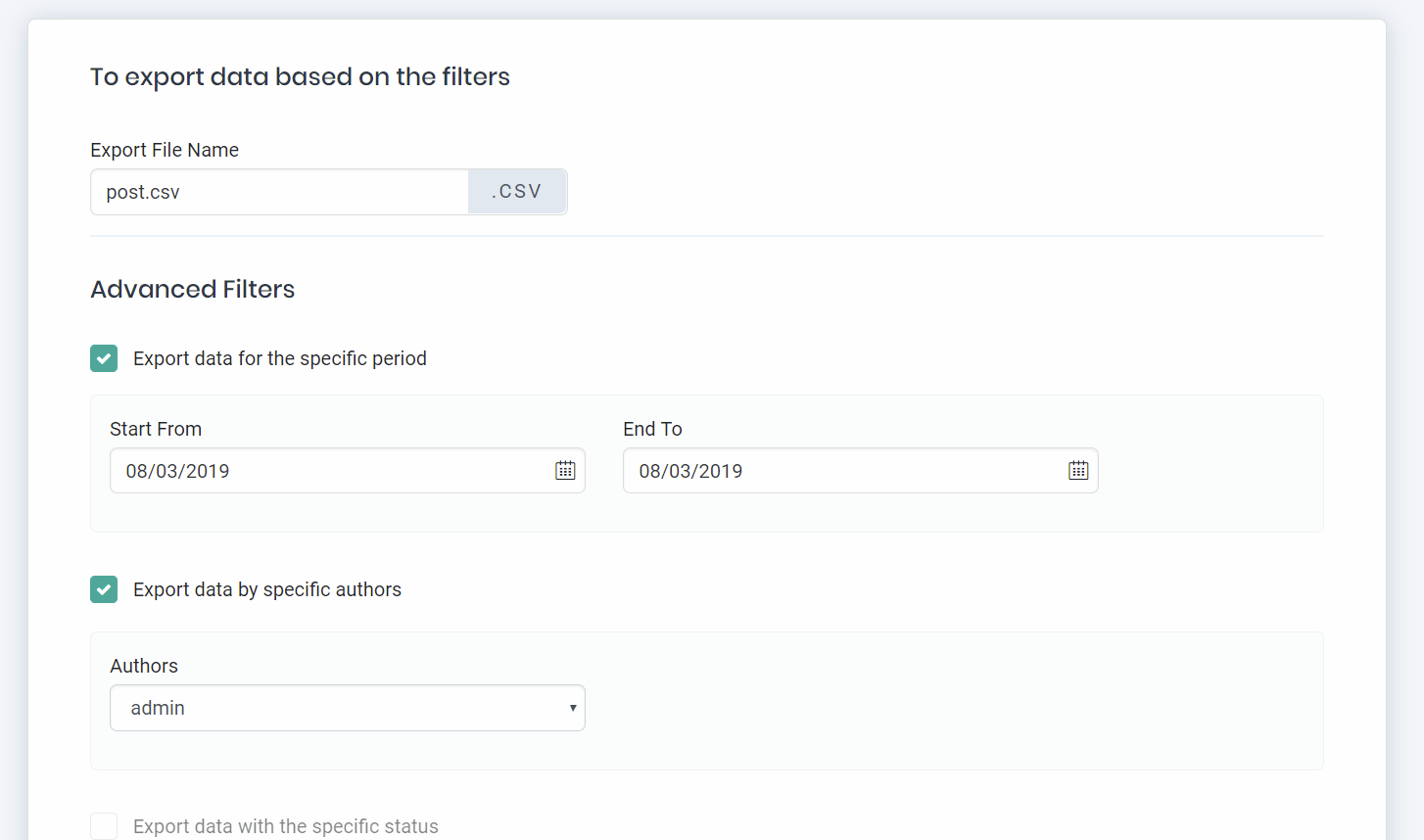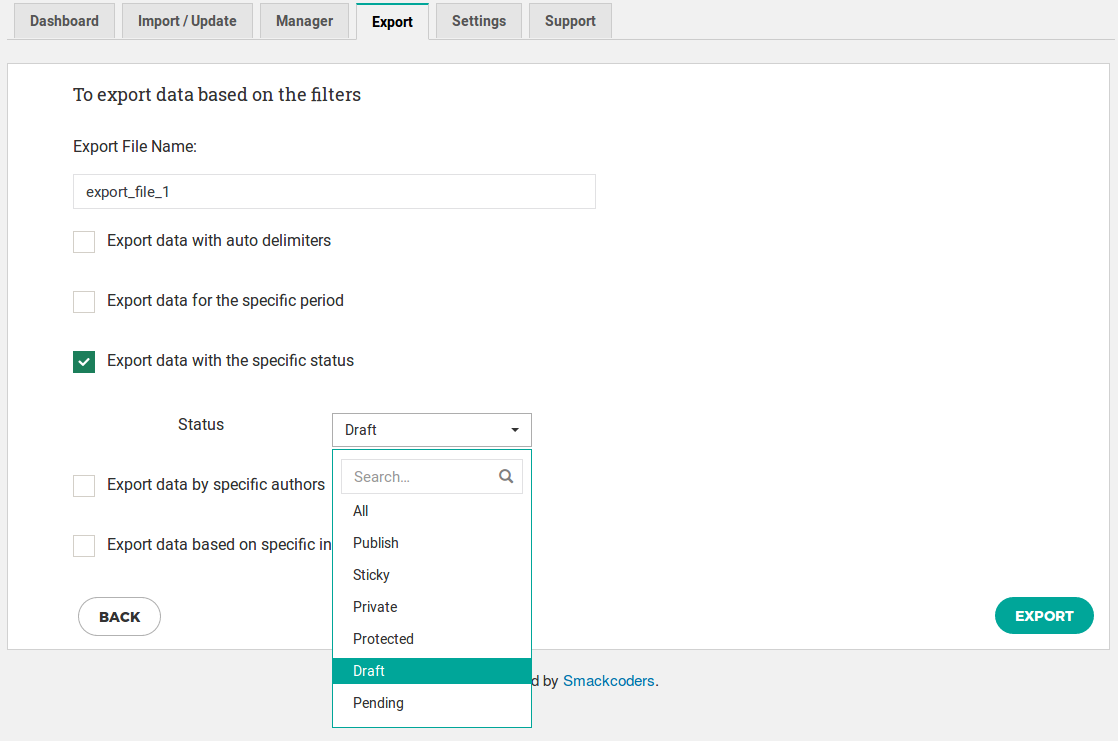
Export All Posts, Products, Orders, Refunds & Users Plugin
Effortlessly manage your WordPress content with the robust Exporter plugin, offering hassle-free exportation to CSV or XML formats for backup, migrati …
Panicked About Losing Your WordPress Site? Effortlessly Export Your Content Now!
The WP Ultimate Exporter, a powerful add-on for the WP Ultimate CSV Importer, empowers you to create backups, migrate to a new site, or simply have a safe copy of your content – all in a user-friendly format.
Important Note: The WP Ultimate Exporter is an add-on, so you’ll need to install and activate the WP Ultimate CSV Importer plugin first.
It stands out as a powerhouse export tool for WordPress. This plugin empowers you to export all your WordPress content—posts, pages, custom fields, users, and more—with ease, ensuring you have a copy of your data in a format that suits your needs.
Key Features
- Streamlined export process in just two steps.
- Support for various content types, including Posts, Pages, and Custom Post types.
- Export custom fields alongside post types for comprehensive data transfer.
- Auto delimiters and forced quotes to prevent conflicts during export.
- Date filter for specifying a time range.
- Filter data based on different post statuses.
- Easily filter post data by author’s name.
This plugin offers multiple export options, allowing you to export all or specific types of content. Advanced filters enable you to exclude unnecessary items, keeping your exported content concise and essential.
Multilingual Export: Introducing WPML & Polylang Export
For those managing multilingual WordPress sites, the Polylang Multilingual Import Export plugin is a game-changer. Effortlessly export and import content in various languages, ensuring a smooth workflow for your global audience.
WordPress Users Export: With Ultimate Exporter Add-On
By integrating the Import User addon with the Exporter plugin, you gain the ability to take control of your WordPress user base to:
* Complete User Lists: Generate a comprehensive list of all your users, including usernames, emails, and roles.
* Specific User Data: Need user information for a specific purpose? Export targeted user data sets based on your requirements.
* Meta Data & Custom Fields: Capture all the details! Export user meta data and custom fields for a complete user profile snapshot.
(Important Note: Exported passwords are MD Format for security reasons and cannot be used for direct login)
WooCommerce Export: Maximize Your Capabilities with WooCommerce Add-Ons
With the Import WooCommerce addon combined with the Exporter plugin, you can effortlessly:
- Products & Variations: Export all your products, including variations, with detailed information for easy migration or analysis.
- Product Images: Ensure your product visuals travel seamlessly! Export product images alongside your product data.
- Product Categories: Maintain your product organization! Export product categories for a smooth import process on your new platform.
- WooCommerce Orders: For comprehensive order management, consider the additional WooCommerce Order Export add-on. Easily export your orders in CSV format for further analysis or fulfillment needs.
Why Export Your WordPress Content?
Exporting your WordPress content serves various purposes:
- Safeguard Your Data: Life (and technology) throws curveballs. A stray plugin conflict, a hosting hiccup – anything could potentially harm your site. With an exported copy, you can restore your content quickly and minimize downtime.
- Seamless Site Migration: Moving to a new server or hosting provider? The Exporter helps you seamlessly migrate your entire WordPress landscape, ensuring a smooth and uninterrupted user experience.
- Effortless Collaboration: Working with a team? Share specific content sets effortlessly by exporting only the data you need.
- Testing Playground: Experiment with new themes or plugins without jeopardizing your live site. Create a test copy of your content using the Exporter for a safe sandbox environment.
With the WP Ultimate Exporter plugin, exporting WordPress content becomes a breeze!
Exporting Made Simple:
The WP Ultimate Exporter simplifies the process with a clear two-step approach:
- Choose Your Content: Select the specific content you want to export, be it posts, pages, custom fields, users, or more.
- Refine and Download: Customize the export with options like file format (CSV or XML), filter unwanted data, and configure author, status, and date range for a tailored export.
Don’t wait for disaster to strike! Secure your WordPress content today with the WP Ultimate Exporter plugin. Visit the WordPress plugin directory or search online for “WP Ultimate Exporter” to get started.
Try it in action
You can explore the functionality of the plugin through our demo sites:
We appreciate your support! If you find the plugin useful, please consider giving it a rating 🙂
If you need a WordPress import & export tool, you can check on our WP Ultimate CSV Importer for advanced features.
Helpful links
For support and feature requests, visit Smackcoders support .
Read the blog to know about our latest WordPress add-on updates.
Installation
First, install CSV Importer and then install the wordpress export plugin.
Extract the wp-ultimate-exporter.zip in your WordPress root/wp-content/plugins using FTP or through plugin install in wp-admin.
Activate the plugin in the WordPress plugin list.
Screenshots
FAQ
There are two ways to export your content:
Through the WordPress admin panel.
By using a WordPress export plugin.
Exporting through the WordPress Admin Panel is limited and there are plugins available with the most advanced features that the default tool does have. Primarily this export doesn’t support CSV, Xls, or JSON files.
To export your content from the WordPress admin panel, simply navigate to Tools > Export in the left-hand menu.
From here, you can choose to export all content or only certain types of content (such as posts or pages). Once you’ve made your selection, click the Export button and save the resulting file to your computer.
- Exporting via our plugin
If you prefer, you can also use this plugin to export your content as a CSV, XML, XLS, or JSON file format. Simply install and activate the plugin, then navigate to the Export screen.
From here, you can choose what to export, once you’ve made your selection, click the Export button and save the resulting file to your computer.
If you want to export your entire WordPress site, including your settings and configuration, you will need to use a plugin or manual method.
For manual export,
Back up your files as compressed files including wp-content or you can do it separately if the size is too big which you can merge later to the root folder.
Ensure you have a copy of the wp-config.php file, it is better to have multiple version copies of this with a prefix or suffix added to the file name. You will end up updating the new domain or subdomain, DB name, DB password, and host details in the wp-config.php file to make it work in a new environment. In this case, you may need to refer it the old configurations to make sure they are correct.
Finally export your WordPress DB as .sql or zip or gzip format.
You can simply compress it and move it to the desired location. Note that wp-content is the folder where your theme, plugins, media, and backups are stored. You may end up handling a very huge folder, if that is the case you can split and backup them.
If you want to export your WordPress database table to a CSV file, you can use our export tool.
To do this, go to the Export screen in your plugin UI. From there, you can select which type of content you’d like to export. Choose “Posts” if you want to export your blog posts, “Pages” if you want to export static pages, or choose any other options available.
Choose the file type you wish to export, note you can select between CSV, XlS, XML, or JSON format. Click the “Export” button. This will process extracting the information from the WordPress database as the source and convert them into CSV or XLS files to export. Both CSV and XLS formats are openable in any spreadsheet program like Microsoft Excel.
These steps can only back up the WP core DB export that includes all your posts, pages, and comments. The core files, folders, wp-content, and media such as images, are not backed up. Both have to be managed separately, you can use a Backup plugin for the whole WordPress site backup.
Assuming you have a WordPress site up and running, there are two ways to export your database. The first is by using phpMyAdmin, and the second is by using the command line.
To use phpMyAdmin:
Log in to phpMyAdmin.
Select the database you want to export from the left-hand sidebar.
Click the Export tab at the top of the page.
Under Export Method, select Quick * to display only the minimal options.
Scroll down to the Format-specific options section and select Microsoft Word XML format from the drop-down menu.
Click Go to start the export process.
To use the command line:
Log in to your server via SSH.
Navigate to the directory where you want to export the database file.
Export the database with the following command: mysqldump -u username -p database_name > databasename.xml
Enter your password when prompted.
The database will be exported to an XML file in the current directory.
To use the hosting control Panels:
You can back up using cPanel or the hosting panel if it is supported. Search or look for ‘Download a MySQL Database Backup’ under backups. Choose the name of the WP database to download it as a gzip file. If you are not sure, get the DB name from the wp-config.php file in the root.
Yes, you can export all Custom Posts listed in the drop-down.
No, there is no limitation on the number of records you can export.
export_wp is a function for WordPress that generates the WXR export file for download. By default, this function can export all the content for post types with the can_export argument enabled and skip posts with ‘auto-draft’ status.
Like any other function, developers can use it directly in themes or plugin files by attaching it to an action hook or filter hook. All plugins categorized under export use WordPress functions to process the request.
The attribute and header name are user_pass in your export file. The passwords are exported in original md5 format from WordPress DB which is easy to import back in case of site migrations without any issues.
You can always skip or delete the old passwords to generate new passwords during import but that involves extra processes like emailing all users about the change and requesting them to change the temporary password, etc.,
For a controlled export, you have to use available advanced filters and options for desired results. You can also remove unwanted columns even after export by deleting them. Note this can be easy to edit, update, or delete if you choose CSV or Excel format as an option.
Under the export tab, choose WooCommerce Orders as your choice to export. This will export all orders from WooCommerce provided no advanced filters are selected. You can use the date filter to limit the time range of the orders created. Apply other options as desired, and export the data. If you wish to export WooCommerce orders to Excel for editing and manipulation, make sure that you have selected XLS in the file format options.
When you click to download the exported data, the file is downloaded through your web browser. You can find it in Browser > Download (Ctrl + J) and click show in folder. The default download location should be C:\Downloads on your Windows PC.
Yes, you can export images for WooCommerce products. They are respectively for the default WooCommerce setup as follows.
- featured_image: Inputs should be the image URL which is publicly accessible and downloadable.
Example: https://ps.w.org/wp-ultimate-csv-importer/assets/banner-772×250.jpg
- product_image_gallery: This a set of multiple image URLs that is publicly accessible and downloadable separated by pipe symbols like image21.jpg|image82.png|topview.png.
Example:https://ps.w.org/wp-ultimate-csv-importer/assets/banner-772×250.jpg|https://ps.w.org/wp-ultimate-csv-importer/assets/icon.svg?rev=2795463
Product Shipping Classes in WooCommerce make it easier to configure shipping rates for a set of products & and categories. That is to manage additional handling or special packaging, to set up free or flat-rate shipping. The attribute for Product Shipping Classes is exported as product_shipping_class that is assigned to the product.
In the case of import, make sure the shipping classes are already created and input the proper values. You can do a sample export to verify the product_shipping_class values before manipulating your import values.
The plugin will export all the attributes involved, even if they are non-mandatory or have no values. The future release will have filtering options to exclude empty fields to trim unnecessary columns that could increase the import performance.
Here is the main attributes list:
user_login
user_pass
first_name
last_name
user_email
user_url
display_name
biographical_info
wp_capabilities
wp_user_level
role
Some of the WordPress user default profile data exported are:
user_nicename
user_registered
disable_visual_editor
admin_color
enable_keyboard_shortcuts
show_toolbar
wp_dashboard_quick_press_last_post_id
Added to that, WordPress member’s user metadata that can be exported are:
mem_email
mem_text
mem_tarea
mem_multiselect
mem_select
mem_radio_gp
mem_password
mem_image
mem_file
mem_url
mem_number
mem_date
mem_checkbox
In the case of WooCommerce customers below listed user meta is exported:
woocommerce_api_consumer_key
woocommerce_api_consumer_secret
woocommerce_api_key_permissions
wpscshipping_region
wpscbilling_region
wpsccart
billing_first_name
billing_last_name
billing_company
billing_address_1
billing_address_2
billing_city
billing_postcode
billing_state
billing_country
billing_phone
billing_email
shipping_first_name
shipping_last_name
shipping_company
shipping_address_1
shipping_address_2
shipping_city
shipping_postcode
shipping_state
shipping_country
Changelog
2.5.2
Release date: 2024-07-16
Enhancements
- Added: Export support for types basic fields
- Fixed: Export product category missing polylang language code and translated_title
2.5.1
Release date: 2024-05-28
Enhancements
Introducing the Elementor templates bulk export (addon) as a single CSV file, allowing you to back up your entire template library in a single, portable CSV file.
Now, you can export content such as Posts, Pages, Custom Post Types (CPTs), and WooCommerce Products designed with Elementor as a CSV file from your Elementor WordPress websites
2.5.0
Release date: 2024-05-21
Enhancements
- Introducing a new WPML import feature, enabling users to import multilingual content as posts and pages using the WordPress CSV Importer plugin for both CSV and XML files.
2.4.10
- Fixed: WooCommerce products and orders Export Issue using advanced filter.
- Fixed: PHP Notice: Trying to get property guid of non-object issue.
- Fixed: PHP Notice: Trying to access array offset on value of type int issue.
- Fixed: Fatal error occurred when the WooCommerce bundle plugin was active.
- Fixed: PHP Notice: Function wpdb::prepare was called incorrectly issue.
- Fixed: Notice errors occurred when exporting categories issue.
- Fixed: PHP Notice: Function wpdb::prepare was called incorrectly.
- Fixed: Issue with empty total row count.
- Fixed: PHP Notice: Trying to access array offset on value of type bool.
- Fixed: Fatal error: Uncaught TypeError: ltrim(): Argument $string must be of type string.
- Fixed: PHP Deprecated: Creation of dynamic property issue.
2.4.9
- Fixed: Woocommerce product bundle and grouped export 500 error issue
2.4.8
- Fixed: WordPress custom fields export issue
2.4.7
- Fixed: LifterLMS course multiple instructor export issue
2.4.6
Fixed: Resolved ‘event’ post type export works alongside with Events Manager (event) plugin.
Fixed: Resolved path issue, Updated export file path to utilize dynamic values
2.4.5
Resolved: issue with HTML format error during download.
Added: export support for Events Manager.
Fixed: Polylang issue.
Resolved: upgrade notice issue
2.4.4
- Removed: Unwanted Upgrade Notice Removed
2.4.3
Added: Polylang multilingual support
Added: export support for tags and category
2.4.2
Vulnerability issue fix Unauthenticated Information Disclosure * https://www.wordfence.com/threat-intel/vulnerabilities/wordpress-plugins/wp-ultimate-exporter/wp-ultimate-exporter-22-unauthenticated-information-disclosure
Fixed: All in one SEO Export
Fixed: Yoast SEO Export
Fixed: RankMath SEO Export
Checked: Compatibility for WordPress 6.4.2
Added: Latest WooCommerce Database Support
2.4.1
Fixed: Unauthenticated Information Disclosure Vulnerability reported by Wordfence
2.4
- Added : Bulk elementor templates export
2.3
- Tested: WP 6.4.1 version compatibility
2.2
Checked: 6.3 version compatibility
Updated: Taxonomy fix
2.1.2
- Fixed: WooCommerce custom attribute export issue
2.1.1
- Fixed: Minor bugs
2.1
Added: LifterLMS and MasterStudy LMS export support
Checked: 6.2 version compatibility
2.0.1
Fixed: Minor bug fixes
Fixed: WooCommerce Orders export
2.0
Added: support for WooCommerce Orders export
Added: support for WooCommerce Coupon Export
Added: support for WooCommerce Refund Export
Added: Usability and UI Improvements
Added: Taxonomies export support
Added: XLS, XML, and JSON export file formats
Fixed: Critical & Activation errors (PHP 8.1 )
Checked: 6.1.1 version compatibility
1.7.9
- Fixed: Activated addon and updated links for main plugin installation
1.7.8
Fixed: Plugin activation notice error
Checked: Compatibility for WordPress 6.0.2
1.7.7
Added: Export support for Jet Engine Metabox Basic Fields
1.7.6
- Added: Export support for the Meta Box plugin
1.7.5
- Added: Export support for the Meta Box plugin
1.7.4
- Fixed: Export date filter
1.7.3
- Checked: Compatibility for WordPress 6.0
1.7.2
Added: Export Support for WP Job Manager Plugin.
Checked: Compatibility for WordPress 5.9.3
1.7.1
- Checked: Compatibility for WordPress 5.9
1.7
- Added: Export support for latest LearnPress-LMS plugin-V4.1.4.1:Courses,Lessons,Quizzes,Orders and Questions.
1.6.3
- Added: Export support for the latest woocommerce product bundle plugin fields
1.6.2
- Added: Compatibility for WordPress 5.8
1.6.1
Added: Compatibility for WordPress 5.7.2
Added: Export support for Polylang & Polylang for WooCommerce plugin.
1.6
Added: Compatibility for WordPress 5.7.1
Added: Compatibility for All in One SEO latest version 4.1.0.2
1.5.9
Fixed: CPT Export
Added: WordPress 5.6 compatibility
Added: PHP 8 compatibility
1.5.8
Added: WordPress 5.6 compatibility
Added: PHP 8 compatibility
1.5.7
- Added: Extended Export support for WooCommerce Product Bundle Fields.
1.5.6
Added: Compatibility for WordPress 5.5.1
Added: Export support for Variation Swatcher for WooCommerce Plugin.
1.5.5
- Added: Export support for WC Product Bundle Meta Fields.
1.5.4
- Added: Export support for specific Widget Values(Posts, Pages, Comments, Categories and Archives).
1.5.4
Added: Export support for BBPress Plugin(forum, topic and reply).
Added: Navigation Menu Export.
1.5.2
- Added: WP CSRF Protection
1.5.1
- Added: Export support for Learnpress-LMS Plugin(Courses, Lessons, Quizzes, Orders and Curriculum).
1.5
- Added: Support for comment reply field
1.4.9
- Fixed: Post Category hierarchical export issue
1.4.8
- Checked: Compatibility for WordPress 5.3.2
1.4.7
- Fixed: Custom Post Export Issue
1.4.6
Fixed: CPT-UI with product category export issue
Fixed: Minor issues and warnings
1.4.5
Added: new API call to find plugin is installed or not
Added: notice/alert for the plugin not installed.
=1.4.4 =
Added: Display the total number of records of export
Added: Progress bar and time indicator.
Fixed: WooCommerce attribute export
Fixed: Custom post export
=1.4.3 =
Added: Compatibility for WordPress 5.0.3
Fixed: Permission issue with the file export.
1.4.2
- Added: WP CSRF Protection
1.4.1
Added: Compatibility for WordPress 5.0
Fixed: Tags Export
1.4
Added extra modules for export
Fixed: Quoted fields export
1.3
Added: Selective field-based export.
Modified: User Interface.
1.2
- Added: WordPress 4.6 compatibility.
1.1
- Fixed: Comma-separated vulnerabilities.
1.0
- Initial release version. Tested and found to work well without any issues.





